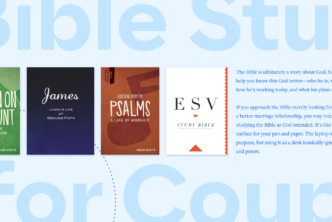At one point in the famous allegory Pilgrim’s Progress, Christian finds what he thinks is a more agreeable path to the Celestial City; but this choice puts him in the grips of the savage brute Giant Despair, and he finds himself locked in the dungeon of Doubting Castle.
It’s not always easy for me to discern my subtle shift off the path toward Doubting Castle, but once in the grips of Despair, his maneuvers are unmistakable.
I fritter away my evening, get to bed late, and awake groggy. I arrive late for work, and during my commute someone—a giant—is speaking: you’ve blown it again, this day is irredeemable.
I get home after a fruitless day, uninterested in my children’s stories, insensitive to my wife, irritable, and supernaturally tired. Someone is speaking, You wasted this entire day, I knew you would, you are so predictable—always a failure!
Under the influence of that voice I have often thought that if there was an undo button on my existence I would have pushed it long ago; that it would be best if I could just be deleted; erased from the hard drive of history.
Which is exactly how Jeremiah felt.
The weeping prophet
Jeremiah has a reputation for being the Puddleglum of the prophets. But this “weeping prophet” didn’t need Prozac; he wasn’t a self-absorbed, introspective, clinically depressed killjoy. He was a believer in the great faithfulness of a God who gives new mercies every morning. And yet, if ever a man had grounds for discouragement it was Jeremiah.
Whatever your struggle, the underlying questions are always the same: Is God really good, is he really good to me; or is he indifferent, aloof, an underachiever, never really exerting himself for my benefit?
That is the fight of faith—one Jeremiah fought and won.
The only indication that Jeremiah ever experienced joy are a scant few lines in Jeremiah 15, when a lost portion of Scripture was recovered in the temple. But when the discovery sparked a half-hearted revival, Jeremiah refused to rejoice. The nation had not truly repented. Their hearts were not right. And Jeremiah couldn’t change that. He would not see real revival in his days.
Jeremiah was forbidden to marry, forbidden to mourn or offer consolation, forbidden to celebrate with those who rejoice, and he was on at least three occasions forbidden to pray for his unrepentant countrymen (Jer 16:1-9; 7:16-20; 11:14-17; 14:11-12; 15:1). He was plotted against by kith and kin, by priests and prophets; pursued by the king’s assassins, slandered by the people, falsely accused, unjustly imprisoned, beaten and betrayed, a man of whom the world was not worthy (Jer. 11:18-12:6; 26:7-11; 36:26; 18:18; 37:11-16; 20:1-2). It was not without cause that he, too, looked for an undo button on his existence:
Woe to me, my mother, that you have borne me
As a man of strife and a man of contention to all the land!
I have not lent, nor have men lent money to me,
Yet everyone curses me. (15:10)
More than once he questioned the justice of being born (cf. 20:14–15). No one seemed to listen to him, up to and beyond the fall of Jerusalem in 586 B.C. He was tempted to forsake his calling; he accused the Lord; he wrestled with doubt; his faith wavered. But in the end he persevered. He opened his mouth and thundered.
Jeremiah’s hope
With provocative, graphic imagery, Jeremiah painted a picture of the approaching doom. When you read him, you can hear the executioner’s drumroll from the first chapter.
But when the dreadful day arrives it is reported in chapters 39 and 52 with the dispassionate tone of an inventory clerk tallying the casualties and plunder. There is no poetic expression of the great calamity. It is possible that Jeremiah held back the torrent of emotion this tragedy required, and poured it all into a series of acrostic poems we know as Lamentations.
Lamentations is a hurricane of hopes dashed and horror’s domination, and the eye of the storm is in chapter 3. But it is no placid calm; it is an arena. We are spectators to a mortal conflict; witnessing Giant Despair with all the power of darkness, palpable terror, heart-rending bereavement, deranging regret, and bewildering perplexity bearing down on the soul of a solitary believer. Jeremiah’s ears are saturated with the screams of the slaughtered, the groans of the famished, and the wails of bereaved mothers. His eyes are gorged with violence, murder, rape, and cannibalism. Giant Despair plants his foot on the prophet’s neck and whispers, “Behold the real; God does not reward those who seek him; your soul will see no good.”
And so the weary prophet confesses:
My soul has been rejected from peace;
I have forgotten happiness.
So I say, “My strength has perished,
And so has my hope from the Lord.”
He has no confidence that he may expect any good from the Lord, but before faith breathes its last he turns again to God:
Remember my affliction and my wandering, the wormwood and bitterness.
Surely my soul remembers
And is bowed down within me.
Then he deliberately turns from remembering his circumstances to recalling the character of God. He forces his mind away from the visible to the eternal.
This turning of his mind is the hinge from despair to hope, and the defiant action we must take when we too are overcome by despair. As dawn rends the darkness to proclaim that day has returned, so hope arises. Hope is resurrected to slay Giant Despair and shake the foundations of Doubting Castle.
This I recall to my mind,
Therefore I have hope.
Why does he have hope? Because of the Lord’s inexhaustible affection for his own:
The Lord’s lovingkindnesses indeed never cease,
For His compassions never fail.
They are new every morning;
Great is Your faithfulness.
The stricken saint summons an ancient incantation to shatter the deadly spell of Despair. It is a holy incantation, sung by generations; a celebration of the certainty that the Lord’s affection for his own is never depleted. What the NASB translates lovingkindness is the Lord’s covenant love, His commitment, His loyal love, His benevolent disposition toward those who fear Him.
So Jeremiah’s first ground for hope is this eternal disposition of God toward His people, and the second is an eternal possession. Lamentations 3:24 continues,
The Lord is my portion,“ says my soul,
“Therefore I have hope in Him.”
Our portion, our possession is the Maker of all things, if we have Him, we have everything. And we have Hope.
Conclusion
Few Christians have evaded Giant Despair entirely. Some have been badly mauled by a brutal encounter with him. Others have wasted away in Doubting Castle.
But when our comforts cease and peace departs, if like Jeremiah we meditate on the God whose inexhaustible affection is our eternal possession—then we will have a key to open any door in Doubting Castle, and we will know the truth of Lamentations 3:25:
The Lord is good to those who wait for Him,
To the person who seeks Him.
David Heimann is an engineer in the automotive industry. His hobby is learning, and he enjoys visiting other worlds: Middle Earth, Narnia, or most anywhere in the past, real or imagined. He and his wife and two children live in the beautiful Piedmont of South Carolina.







